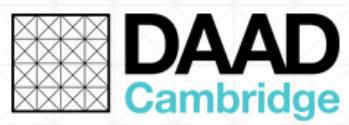
Submitted by Administrator on Mon, 16/01/2017 - 17:55
The DAAD Cambridge Research Hub decided to fund a graduate reading group on 'Challenges to European unity' in 2017. The hub offers funding to groups of graduates who wish to follow a course of critical reading and discussion and invite a leading expert from Germany to join them.
Cambridge, October 2016
The Management Committee of the DAAD Cambridge Research Hub decided that the application in the Graduate Reading Group category, submitted by PhD candidate Sebastian Steingass, was successful. The hub offers funding to groups of graduates who wish to follow a course of critical reading and discussion and invite a leading expert from Germany to join them for a close session. The committee was greatly impressed with the proposal for a graduate reading group on 'Challenges to European unity', sending its thanks for helping to form the intellectual core of this centre of research.
The research hub encourages international networks for graduate students and feels that more than ever it is essential that they have the opportunity to engage with established world-class researchers as well as the leading scholars of tomorrow.
The first session of the reading group will be on 2 Febraury 2017. You can find more information under events.
Outline of the reading group
In recent years, scholarship surrounding European integration and the European Union (EU) has been littered with crises narratives: from the economic and monetary, hybrid security threats and terrorism, refugees and Schengen to populism, and ultimately Brexit. While tensions and conflicts within the EU and around its borders may not have been created by the EU, the struggle to find common policy responses has challenged integration. These challenges have created spaces for transnational politics which are often ignored or downplayed despite their potential. Transnational politics are an instance of European integration, even if, as in the case of populist alliances across Europe, they go against the traditional vision of 'ever-closer union'.
In many ways, Germany's role is central to these responses. This is not only because it has been criticised for both leadership and hesitancy, as in, for example, the 2015 policy on migration. The response that this created all over Europe highlights the role of German actors, from government all the way to civil society. This short series of reading groups will deal with specific instances of challenges to integration that have created space for transnational politics. It focuses on, though discussions are not confined to, transnational responses to migration and challenges to the EU's common border management, the surge of populism on the right and left, and security institutions against the background of hybrid threats and terrorism.
The reading groups are aimed at graduate students, mainly in the field of politics, international studies, peace studies and migration research. Together with an invited scholar from Germany, students will discuss recent academic publications and ongoing research on the outlined topics.
For more information, please contact Sebastian.

